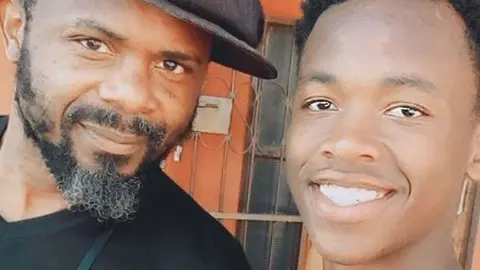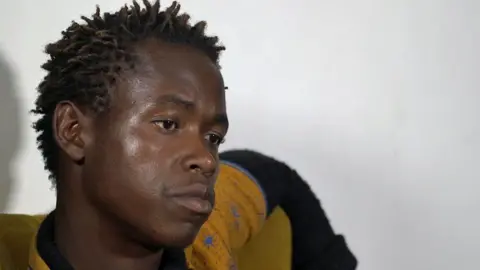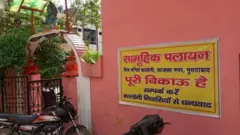 Owas Mwape
Owas MwapeOne of Zambia’s most popular actors and filmmakers Owas Mwape broke a social taboo by admitting that one of his young sons has an addiction to drugs when he posted a recent appeal for advice on Facebook.
The 52-year-old told the BBC he wanted to use his standing as a public figure to open the lid on Zambia’s drug problems and help other parents who fear the stigma of having a child with substance abuse in a socially conservative country.
“I’ve discovered most parents hide such kind of things, they’re hiding their children,” said Mwape, the father of five sons and one daughter.
“It’s out there and on our doorsteps. We can’t run away from it. As long as you send your children to school, know that it could hit your household.”
The star of award-winning films like Mwansa the Great agreed to sit down to do an in-depth interview with the BBC to discuss the acute pain he feels as a parent and the problem that has clearly shattered his family over the last four to five years.
Mayamiko, now 23, was a teenager when things began to unravel.
First his dad noticed that money was missing from his bank account – Mayamiko had hacked his phone to steal about $3,000 (£2,300) over about two years. Then there was some petty thieving.
Initially it was not clear that he was using the money for drugs, but things came to a head a few minutes before he was due to write final-year school exams – and he ran away from home to live on the streets.
It all clearly stunned and pained Mwape who could not believe the boy he described as sparky and generous could have gone down this path, saying his whole demeanour changes when he’s on drugs.
“It’s a very difficult thing to be a father in the moment that I have found myself in. It’s tough because every child is special and Maya is one of those special kids because he is intelligent,” he says.
But he says you have to forgive your children to help them, turning to an African proverb to express himself: “Your child is like an axe, it will hammer you and you pick it up and put it on your shoulder.”
Mayamiko is now back in touch with his father, but it is always on his terms as he uses different phone numbers, making it difficult to contact him.
But it has given his father hope that things can change – though he realises that for any rehab to work, Mayamiko needs to want to change.
When we met for our interview, Mwape had managed to coax Mayamiko to come along too. It was a frank conversation that at one stage turned into a moving discussion between father and son.
“Maya, if we found you work to do and you start getting paid, are you going to work extra hard?” Mwape asked him nearly an hour into our session.
Mayamiko, whose speech was somewhat incoherent and punctuated by long pauses, admitted he would like some help to change his lifestyle and be able to earn money.
 Kennedy Gondwe / BBC
Kennedy Gondwe / BBCHis dad followed up with this question: “Are you promising us that you will stay away from drugs?”
Mayamiko hesitated and said: “Yeah.”
For his father it was a relief to hear that he has aspirations – it is something that he can build on.
But the most frustrating thing for Mwape is that his second-oldest son is never explicit about what drugs he is taking, how he gets hold of them – and often obfuscates when asked a question.
“When you’re trying to speak to him, you can tell that things are not adding up, so that’s why for me I really need that sort of… intervention.”
When probed more during the interview about the drugs, Mayamiko said he mostly took “cheese” – a reference to marijuana – or “anything”.
That is why Mwape, who is currently starring in popular Zambian soap opera Zuba that airs on DStv, took to Facebook, because he wanted to know about rehab centres that have proven examples of success – stories not widely shared in a country where drug addiction is such a hush-hush affair.
There are several private facilities in Zambia – but no publicly funded one – and he says some people have even reportedly sent their children to China.
“I couldn’t believe [it], there were a number of parents who came into my inbox with similar problems,” he said.
Mwape’s experience has also influenced the films his company has recently produced – with subject matter considered to be “un-Zambian”.
“Girls 2 Ladies is about drugs in boarding schools,” he said.
“I’m not saying boarding schools are not good, but I think it’s important as parents now that we put a keen eye to try to find out what type of schools we’re sending our children to, [which is] one of my greatest fears even with what type of rehabilitation centre I should send him [Mayamiko] to.”
His oldest son, Maxwell, has just directed The Flask, a hard-hitting account of an alcoholic’s downward spiral into addiction that will be released next month.
 Owas Film Productions
Owas Film ProductionsResearching all these projects has led Mwape to the door of Zambia’s Drug Enforcement Commission (DEC) – headed by Nason Banda, whom he praises for his enlightened leadership that favours interventions for youngsters rather than jail – which many parents fear.
“Sending them to prison doesn’t help because there are still drugs in there,” Mwape said.
According to Mr Banda, drug abuse in Zambia is worsening, with some of the most abused drugs being cannabis, cocaine, heroin and over-the-counter medicines such as the cough syrup Benylin, which contains codeine.
He told the BBC there had been a 300% increase in the number of people his organisation had attended to over the past 10 years.
“Now that is just as DEC but we have several other institutions that assist with drug-dependent persons, so that is not the full reflection of the extent of the problem.”
The head of the country’s anti-drug agency said the main drivers of drug abuse were broken families plus the accessibility and affordability of drugs.
Peer pressure and the glamourising of drug culture by adults had also contributed, he said.
The DEC was committed to fighting drug abuse by targeting suppliers, consumers and proceeds of the trade, Mr Banda said, adding that he also wanted the government to launch a dedicated rehab centre if the money was available.
For Mwape, he hopes his openness about his son’s problems will not only help his own family but others too – and stop the country living in denial.
And while he admits the pain of a parent never leaves, he feels he will succeed – and that Mayamiko will get clean.
“Sometimes, battles are never won by simply getting into battle – battles are won by employing strategy and I know that all strategies that I have employed are definitely taking me to the right place.”
More about Zambia from the BBC:
 Getty Images/BBC
Getty Images/BBC



